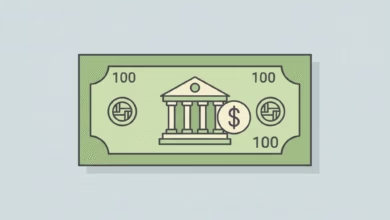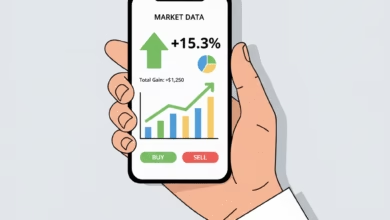5 Questions You Should Ask Yourself Before Applying for Any Loan
Know some questions you need to ask yourself before taking out a loan

In today’s financial landscape, loans are readily available for almost every need, from buying a home to covering unexpected expenses. While they can be powerful tools to achieve your goals, borrowing money is a significant commitment that should never be taken lightly. Before you hit “apply” on any loan, pausing to ask yourself a few critical questions can save you from future financial stress and regret. This article will guide you through the 5 crucial questions you must answer honestly before taking on any new debt.
Why Self-Reflection is Key Before Borrowing: Avoid Costly Mistakes

Impulse borrowing is a common pitfall. Many people focus only on getting the money now and overlook the long-term implications. Asking yourself tough questions forces you to:
- Assess True Need: Distinguish between a “want” and a genuine “need.”
- Evaluate Affordability: Determine if you can truly manage the repayments without strain.
- Explore Alternatives: Consider if there are less costly ways to achieve your goal.
- Understand Risks: Fully grasp the consequences if things don’t go as planned.
This self-reflection is your first line of defense against making a costly financial mistake.
Question 1: Do I REALLY Need This Loan, or Can I Save For It?
This is the fundamental question. Many loans are taken out for items or experiences that could realistically be funded through savings over time.
- Distinguish Needs vs. Wants: Is this loan for a true emergency (e.g., unexpected medical bill, essential home repair) or a strategic investment (e.g., education, starting a business)? Or is it for a luxury item, a vacation, or to fund a lifestyle beyond your current means?
- Evaluate Alternatives: Have you explored all other options? Can you cut expenses in your budget? Sell unused items? Ask for an advance at work?
- The Cost of Patience: If you can save for the item, you avoid all interest payments, making the item significantly cheaper in the long run. Calculate how much you’d save by waiting.
If it’s not an emergency or a critical investment, challenge yourself to save for it instead. The discipline of saving builds stronger financial habits.
Question 2: Can I Truly Afford the Monthly Payments Comfortably?

This isn’t just about whether you can make the payment, but whether you can make it comfortably every single month without stretching your budget thin.
- Create a Realistic Budget: Before applying, outline all your monthly income and expenses. Don’t forget irregular expenses.
- Factor in Unexpected Costs: What if your car needs a repair? What if you have a medical emergency? Will the loan payment still be manageable?
- Assess Your Debt-to-Income (DTI) Ratio: Calculate your current DTI (total monthly debt payments divided by gross monthly income). A healthy DTI is typically below 36%. Adding a new loan will increase this ratio.
- “What If” Scenarios: What if your income decreases? What if interest rates rise (for variable-rate loans)? Can you still afford it?
If the loan payment feels like a squeeze, or you’re relying on future uncertain income, it’s a huge red flag. You need breathing room in your budget.
Question 3: Have I Shopped Around for the Best Terms and Rates?
Settling for the first loan offer you receive is a common and costly mistake. Lenders offer vastly different rates and terms based on your creditworthiness and their own policies.
- Compare APR, Not Just Interest Rate: The Annual Percentage Rate (APR) includes the interest rate plus most fees, giving you the true annual cost of borrowing. Always compare APRs from multiple lenders.
- Explore Different Lender Types: Look at traditional banks, credit unions, and online lenders. Each might cater to different borrower profiles and offer unique rates.
- Check for Fees: Be aware of origination fees, application fees, prepayment penalties, late payment fees, and any other charges that add to the total cost.
- Understand Repayment Terms: Compare the loan duration. A longer term means lower monthly payments but more total interest paid; a shorter term means higher monthly payments but less total interest.
Diligently comparing offers can save you hundreds or even thousands of dollars over the life of the loan. Don’t be afraid to walk away if the terms aren’t competitive.
Question 4: Do I Fully Understand All the Loan’s Terms and Conditions?

Signing a loan agreement without fully grasping its content is like buying a product without reading the label. You’re committing to a legal contract.
- Read the Fine Print: Don’t just skim it. Pay close attention to sections on interest calculation, payment dates, late payment penalties, default clauses, and what happens if you miss payments.
- Fixed vs. Variable Interest Rates: Do you know if your interest rate will stay the same (fixed) or fluctuate (variable)? Variable rates can increase your payments unexpectedly.
- Prepayment Penalties: Are you allowed to pay off the loan early without incurring a fee?
- Collateral: If it’s a secured loan, do you understand that your asset (car, home, etc.) is at risk if you default?
- Ask Questions: If anything is unclear, ask the lender to explain it in simple terms. Don’t sign until you understand everything.
Your loan agreement is a binding contract. Ignorance is not bliss; it’s a financial liability. Understand every single detail.
Question 5: What’s My Plan B If Things Go Wrong?
Life is unpredictable. A responsible borrower considers worst-case scenarios and has a contingency plan.
- Job Loss or Income Reduction: What if you lose your job, face reduced hours, or experience a significant income drop? How would you make your payments?
- Unexpected Expenses: What if a major medical emergency or a sudden car repair arises? Do you have an emergency fund, or will the loan payment make it impossible to handle new costs?
- Emergency Fund: Do you have at least 3-6 months of living expenses saved? This fund acts as a buffer, reducing the need for new loans during crises.
- Communication with Lender: Do you know the steps to take if you anticipate a payment problem (e.g., contacting the lender, exploring hardship programs)?
Having a “Plan B” doesn’t mean you expect to fail; it means you’re financially resilient and prepared for life’s inevitable curveballs. Don’t borrow without this safety net.
Final Thoughts: Borrow Wisely, Live Freely

Asking yourself these five essential questions before taking out any loan can transform you from a reactive borrower into a proactive, financially savvy individual. Loans can be beneficial, but only when approached with careful consideration, a clear plan, and a full understanding of the commitment. Take the time for this crucial self-assessment – your financial future will thank you for it.





